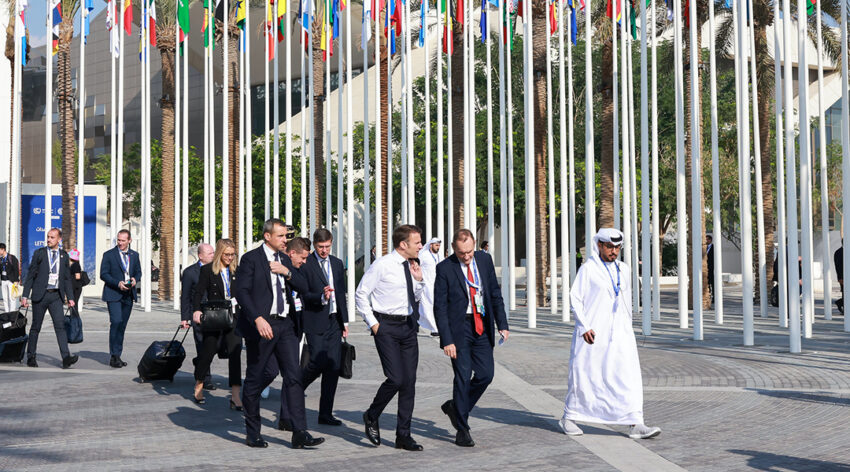The ongoing debate at COP28 over the phase out of fossil fuels is impeding efforts to address the severe impacts of climate change.
“The 1.5-degree limit is only possible if we ultimately stop burning all fossil fuels,” UN Secretary-General António Guterres said last Friday in Dubai. “Not reduce. Not abate. Phaseout — with a clear time frame aligned with 1.5 degrees Celsius.”
Just two days prior to Guterres’ statement, news had surfaced that the current president of COP28 and CEO of the United Arab Emirates’ state-owned oil company, Sultan Al Jaber, had claimed in response to a question from Mary Robinson, a former UN special envoy, that there was no scientific evidence for the imperative phase out fossil fuels.
During the exchange, he went on to say, “Show me the roadmap for a phase-out of fossil fuel that will allow for sustainable socioeconomic development, unless you want to take the world back into caves.”
“This is an extraordinary, revealing, worrying and belligerent exchange. ‘Sending us back to caves’ is the oldest of fossil fuel industry tropes: it’s verging on climate denial,” said Bill Hare, the chief executive of Climate Analytics. “Anyone who cares can find that in the International Energy Agency’s latest net zero emissions scenario, which says there cannot be any new fossil fuel development.
“The science is absolutely clear [and] that absolutely means a phase-out by mid-century, which will enhance the lives of all of humanity.”
A conflict of interest
As COP28 progresses through to its second week, many scientists, politicians, and activists have criticized the appointment of a president who is also chair of a national oil company.
The BBC has reported that Al Jaber’s company, the Abu Dhabi National Oil Company (Adnoc), intends to double its current oil production, by the year 2027. He has also been accused of planning to use the COP presidency as an opportunity to strike oil and gas deals with 15 nations, an accusation which he denies.
Fossil fuel corporations have been aware of their role in climate change since the 1970s, and a report commissioned by Green Peace published earlier this year of 12 major oil giants revealed they are misleading the public about emissions reduction commitments.
In 2022, roughly 93% of their investments went to keeping the companies on the “fossil oil and gas path” while 7.3% promoted low carbon solutions and sustainable production. From now until 2030, the production levels in the leading 20 fossil fuel-producing nations are predicted to exceed more than twice the amount aligned with the goal of restricting global warming to 1.5 degrees Celsius.
The IPCC has previously made clear that humanity needs to cut roughly 50% of greenhouse gas emissions by 2030 and totally phase out fossil fuels by 2050 to avoid the worst climate impacts. As Guterres stressed, the timing of such a phaseout is crucial.
Phasing down fossil fuel use over the next five years can align with science if the result is to cut emissions in half by 2030. But ultimately, such a phase down has to be a step towards an all-but-total phaseout of fossil fuels by 2050.
“The situation we’re in right now, it was unthinkable just three COPs ago to have these debates on the phase-out of all fossil fuels,” said Romain Ioualalen, an environment activist with Oil Change International in an interview with PBS. “There’s definitely momentum in the conversation. There’s definitely opposition, of course. And that’s that’s to be expected. But that’s what we need to solve.”
A murky future
To address the urgent need to curtail fossil fuel emissions and mitigate rapidly intensifying climate impacts, substantial and swift reductions are imperative. Support for a fossil fuel phase out comes from over 100 countries, making it a critical point of contention at the COP28 summit. Whether the final agreement explicitly advocates for a phase out or employs milder language like “phase down” is likely to be the decisive factor in determining the summit’s success.
This brings us to another subtlety in the language being used at COP28. Al Jaber and others have made claims regarding the phasing out of “unabated” fossil fuels. However, in this context it typically refers to the emissions produced by fossil fuel sources without any reduction or mitigation measures in place, such as efforts to capture or prevent the release of greenhouse gases into the atmosphere.
Sir David King, a former chief science adviser to the UK government, recently expressed skepticism about the notion that the global deployment of carbon capture technology could be scaled up enough to justify the ongoing or increased use of fossil fuels, as envisioned by the interests of the oil and gas industry. He described this idea as “absurd” during a recent Covering Climate Now press briefing.
Saudi Arabia’s minister has already said his country will not agree to any language in the final text committing to even a phase down of fossil fuels, much less a phase out. Because the final text of a COP requires a consensus vote, time and again real progress has been stymied and undermines the credibility of such talks.
In response to the situation currently unfolding at COP28, former US vice president Al Gore told Bloomberg that he wants to diminish the de facto veto authority held by fossil fuel states in upcoming COPs. Gore proposed a modification to COP rules wherein a final text could be endorsed by a 75% supermajority of countries, as opposed to the current requirement of unanimous consent.
Considering that more than 100 countries have officially expressed support for phasing out fossil fuels at this COP, altering this rule could significantly shift the dynamics of influence in international climate negotiations and their eventual outcomes. Gore acknowledged that securing approval for such a rule change would be “extremely difficult,” but emphasized that given the high stakes involved, every possible strategy should be attempted.
Feature image credit: COP28 / Andrea DiCenzo

